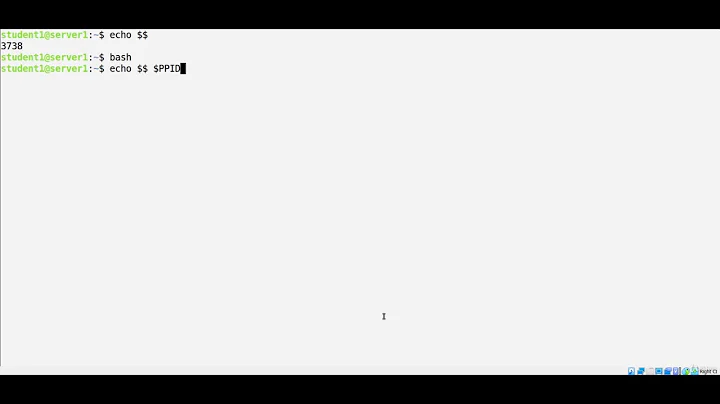How to get parent PID of a given process in GNU/Linux from command line?
Solution 1
Command line:
ps -o ppid= -p 1111
Function:
ppid () { ps -p ${1:-$$} -o ppid=; }
Alias (a function is preferable):
alias ppid='ps -o ppid= -p'
Script:
#!/bin/sh
pid=$1
if [ -z $pid ]
then
read -p "PID: " pid
fi
ps -p ${pid:-$$} -o ppid=
If no PID is supplied to the function or the script, they default to show the PPID of the current process.
To use the alias, a PID must be supplied.
Solution 2
To print parent ids (PPID) of all the processes, use this command:
ps j
For the single process, just pass the PID, like: ps j 1234.
To extract only the value, filter output by awk, like:
ps j | awk 'NR>1 {print $3}' # BSD ps
ps j | awk 'NR>1 {print $1}' # GNU ps
To list PIDs of all parents, use pstree (install it if you don't have it):
$ pstree -sg 1234
systemd(1)───sshd(1036)───bash(2383)───pstree(3007)
To get parent PID of the current process, use echo $$.
Solution 3
This is one of those things I learn, forget, relearn, repeat. But it's useful. The pstree command's ‘s’ flag shows a tree with a leaf at N:
pstree -sA $(pgrep badblocks)
systemd---sudo---mkfs.ext4---badblocks
Solution 4
Parent pid is in shell variable PPID, so
echo $PPID
Solution 5
Read /proc/$PID/status. Can be easily scripted:
#!/bin/sh
P=$1
if [ -z "$P" ]; then
read P
fi
cat /proc/"$P"/status | grep PPid: | grep -o "[0-9]*"
Related videos on Youtube
Vi.
Updated on September 17, 2022Comments
-
Vi. over 1 year
Resolved before asked:
cat /proc/1111/status | grep PPid-
Aquarius Power over 9 yearsfaster:
grep PPid status |cut -f2like intime(for((i=0;i<1000;i++));do grep PPid status |cut -f2 >/dev/null;done); wonder if there is something even faster? -
Mancika about 8 years@AquariusPower Since you ask, fgrep is faster than grep.
fgrep PPid status |cut -f2 -
Marian about 7 yearssed is way faster than grep and cut:
sed -rn '/PPid/ s/^.*:\s+// p' < status -
 P.... almost 3 years
P.... almost 3 yearspid=3773234; while true; do pid=$(awk '/^PPid:/{print $NF}' /proc/$pid/status);printf "$pid\n"; if [ $pid -eq 1 ];then break;fi;done|tac
-
-
user1686 almost 14 years
grep '^PPid:' /proc/$1/status | grep -o '[0-9]*'is all you need. (It is very uncommon for Unix tools to do theif [ -z ]; then readthing.) -
Vi. almost 14 years@grawity It helps do do things like
echo $$ | ppid | ppid | ppid -
Vi. over 11 yearsYes, but 1. I want parent pid of other process, 2. I want to be able to traverse all ancestors to init.
-
Paul Whittaker over 11 yearsOn the other hand, using
$PPIDdid just solve the problem I had which Google suggested this page as an answer to. -
Vi. over 11 yearsIt is to be used non-interactively. I already know that in
htopyou can configurePPIDcolumn. -
Assembler over 11 yearsThe
=sign is not necessary, at least on OS X 10.8.2. -
 Dennis Williamson over 11 years
Dennis Williamson over 11 years -
 Dennis Williamson over 10 yearsThat doesn't give the parent PID which is what the OP asked for.
Dennis Williamson over 10 yearsThat doesn't give the parent PID which is what the OP asked for. -
Sorceri over 9 yearsUUOC useless use of cat
-
Vi. over 9 years@FelipeAlvarez, My hands are not used to type
< /some/file grep | grep | .... -
Sorceri over 9 yearsWhat about
grep /some/file -
Citizen Kepler almost 8 yearsThanks for this answer, it helped me on an embedded system that only had one flag for ps (-w for wide output) so all of the answers using ps did not work for me. Thanks!
-
 sudo over 6 years
sudo over 6 yearspstreeis the nicest one I've seen here. -
bobbogo over 6 yearsUseless use of echo? ;)
-
 sebastian_t over 6 yearsIt is actually required on some terminals. To be honest I don't remember exactly but it actually solved a problem. :D
sebastian_t over 6 yearsIt is actually required on some terminals. To be honest I don't remember exactly but it actually solved a problem. :D -
 Connor McCormick almost 5 years
Connor McCormick almost 5 yearsps jis great because it's available on many distros and is easily composable -
Alex78191 about 4 yearsWhat about
ps f? -
nyov almost 4 years@Alex78191 why do you ask? What about it? It does something completely different to what the question asked.
-
 smac89 over 3 yearsprefer alias if you want any shell auto-complete to still work
smac89 over 3 yearsprefer alias if you want any shell auto-complete to still work -
Bruno Bronosky over 2 years@John-Karahalis I appreciate your edit. It was rejected by 2 other reviewers, but I agree and usually use long options to save readers time having to look up the meaning of cryptic flags. Thanks!
-
 Admin almost 2 yearsAuto-completion of function names works just fine for me.
Admin almost 2 yearsAuto-completion of function names works just fine for me.




